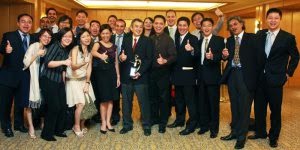By Lai Kok Fung, BuzzCity CEO
I have a confession to make. It won't come as much of a surprise, though, to my friends, family and colleagues:
I'm a Geek.
In fact, I'm proud of being a Geek. For me, a great day is one when I spend hours coding. Now this may seem a bit strange to some. BuzzCity is an international company. Last month, we sold mobile advertising in more than 100 countries. The ads we sold were viewed more than 2 billion times. As CEO, I am responsible for directing our growth, which requires allocating resources and meeting with clients and investors. We hire engineers to design and upgrade our products and systems. So, why should I, a CEO, still get my hands dirty with programming?
In many places – including my home here in Singapore where BuzzCity is based – culture dictates that engineers with career ambitions become managers and VPs. They should take on positions where they no longer utilise their core skill sets and where business models and marketing displace innovation.
At BuzzCity, though, we foster an environment where engineers can still be engineers and where innovation is valued. And I think that's one of the reasons why we have done so well.
INFOCOMM AWARDS
BuzzCity's innovative approach was recently recognised at Singapore's National Infocomm Awards, where we won top prize for having the “Most Innovative Infocomm Product/Service”. Nominees were judged primarily on the innovative use of infocomm technologies or development of infocomm product/service. Other criteria included overall business strategy, business impact created and regional/international market presence.
At times, though, it feels like we are swimming upstream. Despite calls by our government to encourage creative thought and entrepreneurship, Singapore does not really provide a good climate for innovation. And it's not just Singapore. This is true for many of the markets where we do business.
WHAT IS INNOVATION?
How do you define innovation? What exactly is it?
It's like what the US Supreme Court once said about pornography. I don't know how to define it, but I know it when I see it.
We're not talking about “improvements” or “inventions”. We strive to perform better – to improve – every day. We make improvements to existing processes and products. Innovation is something different.
I believe innovation is about addressing problems in a new way. It's about successfully applying new ideas. Often, this can even be in a way that no one saw or thought of before.
In our business, a question that often spurs innovation is “how else will people use a mobile device?”
WHAT HINDERS INNOVATION?
1. The biggest problem is money. But it's not a lack of funding. Rather it's that innovation is measured and motivated by financial rewards. Innovation is viewed by business executives, journalists and governments as a means to an end. Companies that innovate are only admired when their innovation increases revenue, raises profits, leads to a public listing or large payout. This does not encourage a culture of innovation or a workplace where employee creativity is valued. By contrast, take a look at Google or Yahoo! Google began as an intellectual exercise by two Ph.D. students at Stanford University; the Yahoo! search engine started off as a hobby of Jerry Yang. (Yang may be out of favour in business circles at the moment, but his design of the Yahoo! search engine revolutionised the Internet.)
2. I.T. meanwhile is sold to students as a career where they can find stable employment and income. Of course, if there are sectors that pay more – like finance, prior to the recent crisis – then youth are encouraged by their parents, peers and professors to follow these routes instead.
3. I.T. takes a backseat to other parts of a company. It's expected to play a supporting role and is not seen as integral to the process of business. Take the criteria for Singapore's National Infocomm Awards, for example. Nominees are judged on how innovation improves productivity and processes. The key for the judges was how innovation assists other parts of the business.
HOW IS BUZZCITY DIFFERENT?
1. We consistently hire people who enjoy what they do.
2. We provide time for employees to work on personal projects.
3. The tech team works closely with other departments (sales, marketing, business development). Together, we read the market signals, discuss consumer demands and come up with solutions to meet these needs.
4. We encourage people who like to code to keep on doing it.
REFLECTIONS
I went through a phase in my career when my peers told me not to be too concerned with product development or technology. I was advised to focus on building partnerships and power lunches. After all, I was told, that was the best way to both build a company and advance my own career.
My message to our staff – and future employees – now is “it's OK to be a geek.” Despite what your parents, boyfriend, girlfriend, husband or wife may say, you can be proud of being a techie even after the age of 30 or 40.
In fact, if you want to have a career as a Geek, call. We could use you at BuzzCity.

